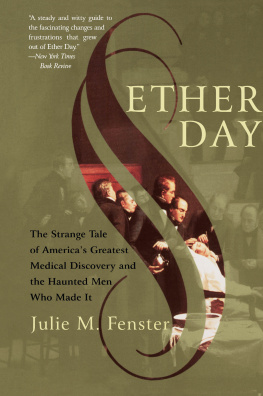NIGHTMARES
OF AN ETHER-DRINKER
JEAN LORRAIN (1855-1906) was the pseudonym of Paul Alexandre Martin Duval. He was one of the leading figures of the Decadent Movement and the author of numerous novels, volumes of poetry and short stories. At one point he was probably the highest paid journalist in France. Though mostly remembered today for his famous duel with Marcel Proust, he might be seen as the true chronicler of the fin-de-sicle.
BRIAN STABLEFORD has been publishing fiction and non-fiction for fifty years. His fiction includes a series of tales of the biotech revolution and a series of metaphysical fantasies featuring Edgar Poes Auguste Dupin. He is presently researching a history of French roman scientifique from 1700-1939 for Black Coat Press, translating much of the relevant material into English for the first time, and also translates material from the Decadent and Symbolist Movements.
JEAN LORRAIN
NIGHTMARES
OF AN ETHER-DRINKER
Translated and with an Introduction by
BRIAN STABLEFORD
THIS IS A SNUGGLY BOOK
Translation and Introduction Copyright 2002, 2016 by Brian Stableford.
All rights reserved.
This Snuggly Books edition is an unabridged, slightly amended version of the translation first published by Tartarus Press in the United Kingdom in 2002 in a limited edition of 350 copies.
ISBN: 978-1-943813-05-6
Contents
Introduction
None of Jean Lorrains biographers has contrived to discover exactly when or why Lorrain began taking ether, or how much of it he took before realising (too late) that it was an extremely bad idea, but the rumours he encouraged when he classified a series of his short stories as contes dun buveur dther were almost certainly exaggerated. He must have had Thomas de Quinceys Confessions of an English Opium-Eater (1822) in mind when he used that title, but he must also have known that there was a world of difference between ether-drinking and laudanum-drinking. Although various English writersSamuel Taylor Coleridge and Algernon Swinburne prominent among themhad produced brilliant visionary fantasies under the influence of laudanum, Lorrain knew too many morphins and morphines to be under any illusion as to its long-term effects on literary production.
Long before he squeezed his first ungenerous drop of ether into a glass of wine or a carafe of water Lorrain knew perfectly well that it was a killer; he could only have risked it in the hope that doses small enough to be harmless might help combat the symptoms of his other maladies. He must, alas, have realised very soon how misguided that hope was, and he probably gave it up within a yeareasily enough, given that the theromanes to which his writings on the subject often refer were not addicts but lunatics unhinged by a strictly temporary recklessness.
Ether is by no means the only hallucinogen to which Lorrains fiction makes reference, but his references to such old favourites as opium and hashish are mostly tokenistic. He was, after all, a dutiful member of the Decadent Movement, more conscientious than most in his pursuit of the Decadent lifestyle as well as the ideals of Decadent literature. One reason for his fascination with ether was certainly the fact that it had not previously been widely featured in Decadent prose, and he was always ambitious to be a pioneer. He had certainly drunk a good deal of laudanum in the attempt to quell the recurrent fevers and headaches to which he was subject, and it is likely that the nightmares he associated with ether had at least as much to do with the legacy of that usage as with the chemical effects of ether itself, but there was little literary scope left for revelations of the effects of opium and hashish since Thophile Gautier and Charles Baudelaire had offered their accounts of the experiments undertaken by the Club de Haschichins in the 1830s and 1840s.
Lorrains tales of an ether-drinker are, in one important sense, set firmly in the tradition established by the Club de Haschichins, whose exploits had provided one of the foundation-stones of Decadent lifestyle fantasy. The pose he adopted in order to set them down and organise them into a series has a mock-scientific aspect; the principal reason why it is the narrators friends who experience the worst effects of ether under his observation is not that Lorrain did not wish his readers to think that the tales were not based on personal experience but because he wanted to preserve the clinicality of his catalogue of the drugs effects. In this he was following an august precedent. The hallucinatory adventures of Thophile Gautier and his friends had been supervised and guided by a doctor named Joseph Moreau, who liked to style himself Moreau de Tours. Moreaus study of Hashish and Mental Alienation (1845), based in these experiments, reprinted the whole of an article on Hashish that Gautier had published in 1843.
Gautiers account of the effects of hashish has little in common with modern reports of the effects of cannabis, and the phenomena he describes presumably had at least as much to do with his own anticipations as with the actual physiological effects of the drug. Lorrains accounts of the hallucinatory effects of hashish, contained in such novels as Monsieur de Phocas. Astart (1901; tr. as Monsieur de Phocas) are so similar to Gautiers that there can be little doubt as to where he researched them, and the legacy of that research seems to have been carried over into his accounts of the effects of ether, suggesting that his experiences under the influence of the drug were prejudiced by expectation. The chief difference between Gautiers musings on the effects of hashish and Lorrains account of the effects of ether is, in fact, an inversion that had already been suggested by Baudelaire. Although Baudelaire was the great pioneer of the Decadent lifestyle, he was sceptical from the very first of Gautiers attempts to find ecstasy through hallucination, and his own essays on the search for artificial paradises concluded that hallucinogens flattered only to deceive, and were far less likely, in the long run, to guide a man to Heaven than they were to deliver him to Hell.
Jean Lorrain knew this before he ever touched a drop of ether, and he was probably set from the very beginning to find the dark side of the coin whose brighter face Gautier had described so enthusiastically:
Never had such beatitude flooded me with its waves: I had so melted into the indefinable, I was so absent, so free from myself (that detestable witness ever dogging ones footsteps) that I realised for the first time what might be the way of life of elemental spirits, of angels, and of souls separated from their bodies. I was like a sponge in the midst of the ocean: at every moment floods of happiness penetrated me... my whole being had been transfused by the colour of the medium into which I had been plunged.
Given this, the real mystery of Lorrains ether-drinking is why he did it at all. It would not have been atypical of Lorrains character and method to have faked the whole thing, merely posing as an ether-drinker for notorietys sake, but even though we do not known how much he took and when, we can be certain that he did indulge, for the simple reason that it killed him. It did not kill him swiftly, and it certainly did not kill him mercifully, but it did kill him. The ulcers it left in his gut were so bad that he had to have a section of his small intestine surgically removed, and it was while attempting to soothe those in his large intestine with an enema that he blew a hole in his colon and perishedalone and unattended, ignominiously as well as horriblyof fecal peritonitis. We may presume that he did not expect this to happen, but he did know the risks. Why, then, did he take them?
*
Although there is no reliable documentation to prove the point, it seems probable that Lorrain first took ether some time after the fateful day in 1886 when he realised, following the death of his father, that his long-anticipated inheritance had all been spent and that he would have to earn a living. He was already well-established as a writer, but while he had lived on the allowance whose eventual dramatic increase he had confidently expected, he had been more than content to adopt the voguish pose of the dilettantish dandy, for whom writing was a vocation rather than a profession. He had published three collections of poetry and a couple of conspicuously literary novels, but these items could hardly be considered a sturdy foundation for a commercial career. As soon as the necessity of making a living by his pen became clear, however, he set to his task with a furious will.
Next page



